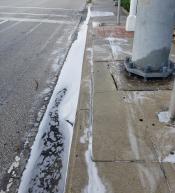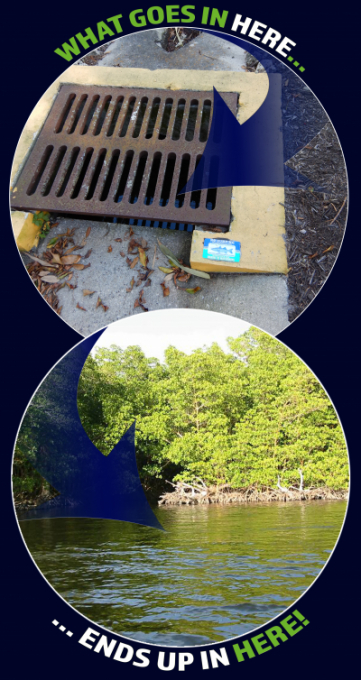Pollution Prevention
ONLY RAIN DOWN THE STORM DRAIN!
NPDES Municipal Separate Storm Sewer System Permits (MS4)
The U.S. Environmental Protection Agency requires the City of Naples to operate its stormwater system in a manner that controls pollution flowing into waters of the State.
The City of Naples stormwater collection system (called a Municipal Separate Storm Sewer System, or MS4) is covered under an NPDES Phase II MS4 Stormwater Permit. Elements of the permit require the City to have a Stormwater Management Program (SWMP) that reasonably attempts to prevent pollution from entering the stormwater collection system from non-point sources.
Elements of the NPDES SWMP cover 6 Minimum Control Measures (MCM). Each MCM has Best Management Practices (BMP) with measurable goals, schedule for implementation and completion. The Florida Department of Environmental Protection (FDEP) administers this program in Florida under 62-624 F.A.C. More information is available here.
Illicit Discharges are prohibited
It is illegal to dump trash, grass clippings, unauthorized chemicals, sediment, paint, waste materials, or any pollutants of any kind into storm drains, ditches, canals, streams, or bays within the City of Naples. If you see someone dumping materials into a stormwater conveyance system or basin, please immediately contact the City’s Code Enforcement Division at 239-213-5030.
Pollutant. Anything which causes or contributes to pollution. Pollutants may include, but are not limited to: paints, varnishes, and solvents; oil and other automotive fluids; non-hazardous liquid and solid wastes and yard wastes; refuse, rubbish, garbage, litter, or other discarded or abandoned objects, ordinances, and accumulations, so that same may cause or contribute to pollution; floatables; pesticides, herbicides, and fertilizers; hazardous substances and wastes; sewage, fecal coliform and pathogens; dissolved and particulate metals; animal wastes; wastes and residues that result from constructing a building or structure; and noxious or offensive matter of any kind.
Illicit Connections. An illicit connection is defined as either of the following:
Any drain or conveyance, whether on the surface or subsurface, which allows an illegal discharge to enter the storm drain system including but not limited to any conveyances which allow any non-storm water discharge including sewage, process wastewater, and wash water to enter the storm drain system and any connections to the storm drain system from indoor drains and sinks, regardless of whether said drain or connection had been previously allowed, permitted, or approved by an authorized enforcement agency or,
Any drain or conveyance connected from a commercial or industrial land use to the storm drain system which has not been documented in plans, maps, or equivalent records and approved by an authorized enforcement agency.
If you see something, say something! Please report to Code Enforcement any activities you observe where paint, soap, or any other pollutants are being allowed into the storm drain!”

Power washing soap entering stormdrain

